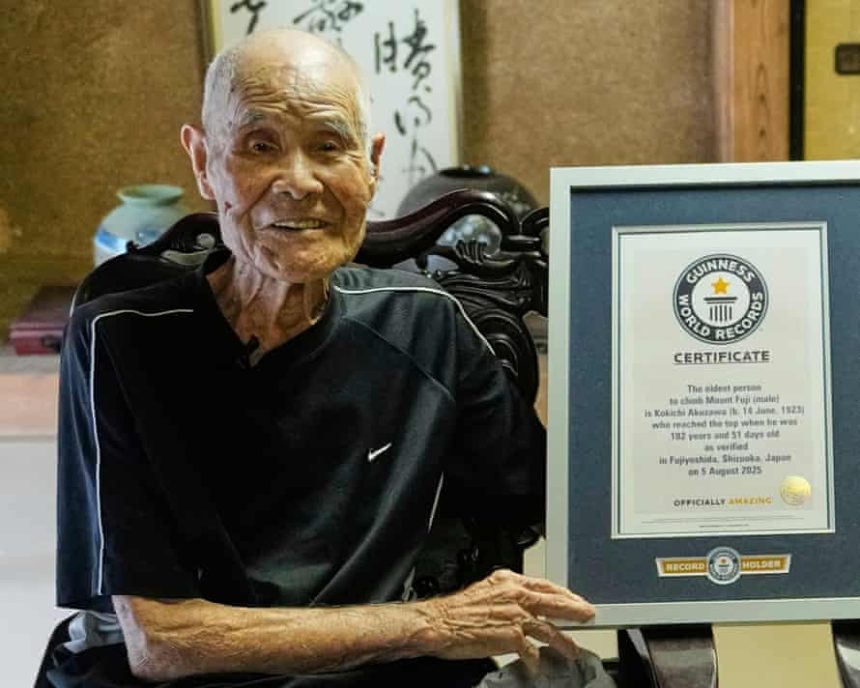At 102 years old, Kokichi Akuzawa has become the oldest person to stand atop Japan’s tallest mountain, Mount Fuji, a feat officially recognized by Guinness World Records.
The retired engineer, who nearly abandoned his attempt partway through, credited his success to the encouragement of those around him.
“I was really tempted to give up halfway through,” Akuzawa admitted. “Reaching the summit was tough, but my friends encouraged me, and it turned out well. I managed to get through it because so many people supported me.”
Akuzawa reached the 3,776-metre (12,388ft) peak on August 5, accompanied by his daughter Motoe, 70, his granddaughter, her husband, and members of his climbing club. The group camped for two nights before making the final push to the summit.
“I’m impressed I climbed so well,” Akuzawa said. His 75-year-old daughter Yukiko, who repeated questions into his ear due to his hearing difficulties, helped him reflect on the achievement. “It’s better to climb while you still can.”
This was not his first record on Mount Fuji. At age 96, Akuzawa had also set the benchmark for the oldest climber to reach the top.
Since then, he has overcome heart problems, shingles, and even a climbing accident that required stitches.
Preparing for this year’s challenge, he dedicated three months to training. Each morning he rose at 5am for long walks, and he scaled roughly one mountain per week in the Nagano prefecture.
From his home in Maebashi, where paintings of mountain landscapes line the walls, Akuzawa recalled that his love for climbing began 88 years ago. “I climb because I like it,” he explained. “It’s easy to make friends on the mountain.”
Over the years, Akuzawa worked first as an engine design engineer and later as a livestock artificial inseminator, a role he continued until age 85.
His philosophy about mountaineering reflects a sense of equality he found on the trails.
“Whether you liked studying or not, you could enjoy the mountain just the same,” he said. “Intelligence didn’t matter up there. We were all on an equal footing and moved forward together.”
Though he once enjoyed climbing alone, he now relies more on the support of others. His latest ascent, he admitted, was the most demanding of his life.
“Mount Fuji isn’t a difficult mountain, but this time was harder than six years ago. Harder than any mountain before,” he said. “I’ve never felt this weak. I didn’t have pain, but I kept wondering why I was so slow, why I had no stamina. I’d long since passed my physical limit, and it was only thanks to everyone else’s strength that I made it.”
While he knows future climbs of Fuji may no longer be possible, he has set his sights closer to home.
“I’d love to keep climbing for ever, but I guess I can’t any more. Now I’m at the level of Mount Akagi,” he joked, referring to a nearby peak about half Fuji’s height.
These days, Akuzawa divides his time between volunteering at a senior care centre and teaching painting. For him, both pursuits echo the rewards of mountaineering.
“People who climb mountains, people who paint; if they can create something whole on that path, that’s the most fulfilling thing,” he reflected.
His daughters are now urging him to capture Mount Fuji at sunrise for his next painting. Smiling at the thought, Akuzawa said, “I’ve got a lot of requests. I want to paint some scenes from the summit of Mount Fuji, places that hold special memories for me, since this was probably my last time reaching the top.”
